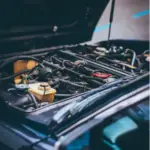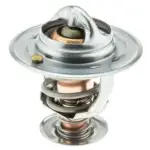If you’re wondering what causes low oil pressure in your engine, you’ve come to the right place. Oil is the lifeblood of your engine. Without proper oil pressure your engine will suffer from a lack of lubrication. This will increase friction causing wear and most likely engine overheating, and in worse case permanent damage.

1. Low Oil Pressure Light
The easiest way to tell if you have low oil pressure is that a light will come on your dash. Some vehicles will even have an oil pressure gauge. The 2003 Ford F150 photographed above has both a low oil pressure light (red) and a oil pressure gauge. You will normally see this light when starting your vehicle, and then it will disappear as the oil pump picks up speed and the oil pressure is adequate. If this light appears you’ll need to get your vehicle serviced immediately.
2. Clunking Sound from Engine
Its never good to hear a loud clunking or knocking sound from your engine, but this issue can sometimes be attributed to low oil pressure. Without proper oil pressure, your engine does not get the lubrication it needs. Clunking noises from the engine can lead to serious and permanent damage. Make sure your vehicle is serviced immediately if you hear these noises. At the very least check your oil, because this could also be caused by low oil levels.
3. Overheating
One of the worst things that can happen to your vehicle is an overheated engine. High temperatures can cause all sorts of irreversible damage like: warped cylinders, blown head gaskets, and more. This can lead to costly repairs. Overheating can be caused by a lack of engine oil pressure. Again an engine with reduced oil pressure will have insufficient lubrication leading to increased friction and heat. Most vehicles come equipped with a temperature gauge.
If you notice your vehicle overheating, stop the car and shut the engine off. You should not drive an overheating vehicle. A good place to start is checking your oil and coolant levels, however to avoid burns, you should wait at least 30 minutes before touching an overheated or recently ran engine.
4. Burning Oil Smell
Burning smells from the engine are generally due to an external fluid leak. Seals and gaskets go through thousands and thousands of heating and cooling cycles throughout there life. These gaskets will not last forever, and it is not uncommon for oil to leak from a failed gasket. If this external leak is on a hot engine part, like the exhaust manifold, a oil burning smell will commence. If this happens to you while driving, make sure you do not check the oil level until the engine has cooled off. External fluid leaks, especially oil should be repaired immediately.
What Causes Low Oil Pressure?
Now that you know some of the symptoms of low oil pressure, its time to look at what caused the low pressure in the first place.
1. Wrong Oil Viscosity
Low oil pressure can be caused by using motor oil with a different/incorrect viscosity. The lower the viscosity the less resistance the fluid will have. The reduction in resistance can cause the pressure sensor to trigger on the dashboard to light up as it thinks the oil pressure is low. However if a motor oil with too high of a viscosity is used, this will increase resistance causing the oil pump to struggle and have low oil pressure.
2. Infrequent Oil Changes
When’s the last time you changed your oil? If you have no idea, its time for an oil change. Overtime dirt, debris, rust, and other junk can get into your oil system. This can clog the oil filter or it can cause blockages at other oil passages. These blockages can cut off oil supply to other parts of the engines. This can cause increased wear and even damage. Keeping up on oil changes is an easy way to keep your engine healthy.
3. Damaged Oil Pump
The oil pump is key ingredient to oil pressure and engine lubrication. Over time these pumps can wear out and malfunction. Gear teeth clearance between the pump housing can increase causing internal leakage in the pump, reducing pressure. Pump outlet diameter can increase with wear and also affect pressure. Oil pump damage or malfunctions can be caused by contamination in the oil, infrequent oil changes, or even an insufficient amount of oil in the engine.
Oil pumps can be difficult to access. If there is an issue with the pump, it makes the most sense to replace it with a new unit as a simple repair or overhaul would be very costly if the repair was unsuccessful.
4. Internal Leakage
Internal leakage happens when oil leaking back to the oil sump before it reaches the components that it needs to lubricate. This leakage generally increases with time and engine wear. Occasionally this can be attributed to a seal or gasket leak. Most vehicles have a PCV valve system. If this system malfunctions it can cause increased pressure in the engine crankcase which can cause other seals and gaskets to leak.
5. Oil Filter Clog
The oil filter is like the guardian to your engine protecting it from contamination, debris, and other particles that can damage your engine. Contaminated oil, or oil that hasn’t been changed in a long time can clog the oil filter reducing oil pressure downstream of the filter.
6. Low Oil Levels
As engines age their oil consumption increases. This is because of wear on the seals and gaskets which can cause leakage external or internal. Some of this leakage can even make its way to the cylinders where it is ignited with the fuel. This will eventually lower the oil levels to the point where there is not enough oil the engine. The lack of oil could trigger the low pressure light on the dashboard.
Conclusion
In conclusion, low oil pressure is a very serious engine issue which should not be ignored. If your vehicle experiences this issue you should repair your engine or get it serviced immediately.
Sources
https://www.lynnessubaru.com/symptoms-of-low-engine-oil-bloomfield-nj.htm



